For us, follow up day was to be spent in and around the Dhakuria Railway Colony which is a very mixed area in the south of Kolkata
where some people live in houses and flats
and many more live in squatter huts or alongside the railway track. Some people there are relatively wealthy and others are abjectly poor.
There is an short article in the Huffington Post about the colony here which will provide some useful background if you do not know anything about it and a Youtube video above which provides rather a long view of the area.
Kolkata has a interesting history. From the days of the East India Company through until 1911, it used to be the capital of India and hence it had a large British garrison (some of my family were born there). Roll forwards to recent times and the Communist Party of India (Marxist) were the ruling party in West Bengal.
Local politicians are very important and hence just before the start of our follow-up we met the ward councillor for the Colony and she decided to accompany us as we worked our way around the colony checking fingers and she was very effective and well known and would not accept any excuses from those whose children had not been vaccinated.
Polio is primarily spread through faecal contamination and India has been increasing the number of public and private toilets available to its population in an attempt to improve sanitary conditions.
This public toilet was on the edge of the area we were checking (and there are some 350 others in the city) but unlike many places elsewhere in India, here it was "pay to use” and hence we did not see many people using it.
There was some, but not a lot of publicity material around telling people to get their children vaccinated. The growing role of government in the vaccination process is perhaps indicated on this poster by including a photograph on it of Mamata Banerjee who is the Chief Minister of West Bengal - a photograph we were to see on most Polio advertising.
Checking involves going around where the children are,
be it with their parents at work,
or in the street,
up alleyways,

or on the railway track
and looking at the little finger of their left hand for the purple mark.
Some children know what to do and you only have to waggle your little finger at them and they will respond.
And if they are not vaccinated
then they are immediately given their two drops of vaccine.
The vaccine is, as always, carried in insulated thermos boxes because it must be kept at a low temperature in order to remain effective.
We came across one child trying to wash the mark off his hand
because word had rapidly spread that if he was vaccinated by us, he might get a small present.
Working on the railway track was an unusual experience.
Many people had set up “shop” adjacent to the track and were just that extra millimetre away from the track to avoid being hit when a train went past.
People also live in huts adjacent to the track
and the track was live with trains frequently passing (slowly).
We soon learnt to get out the way and carry on checking on the other side of the track.
As is always the case, we were welcomed in a friendly way by everyone we met and this child had quickly got over being vaccinated by me.
“Houses" were marked up in chalk as usual showing that they had been checked (Team 59 checked this house on the 29th January 2018 and it passed - i.e. the children supposed to be living in it were inspected and found to be vaccinated).
It was a very interesting place to work and we found that the usual thoroughness of the Indian Vaccination process was as obvious here as it has been elsewhere - most children had the required blue finger.
That thoroughness was demonstrated the following day when
we went on a ferry across the Hoogly River to the other side of town

and found Health workers working on the landing stage looking for evidence of vaccination on all children who went past.
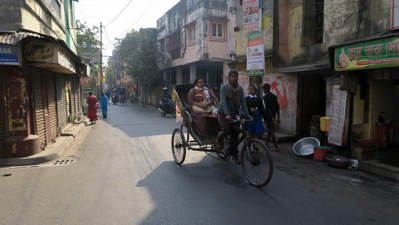





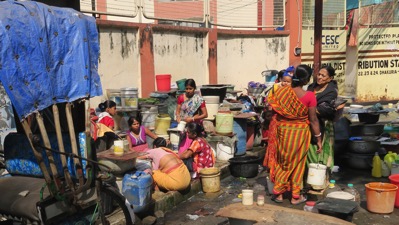


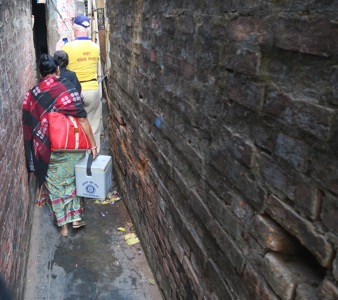




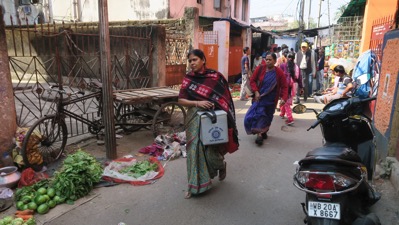






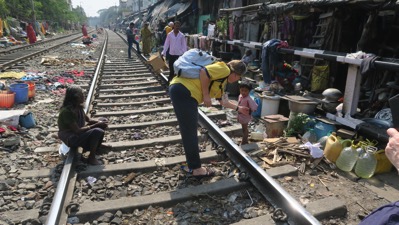


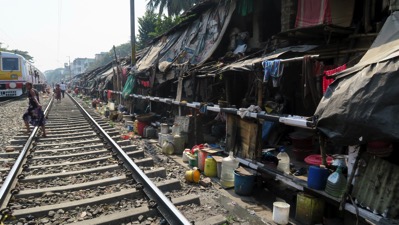
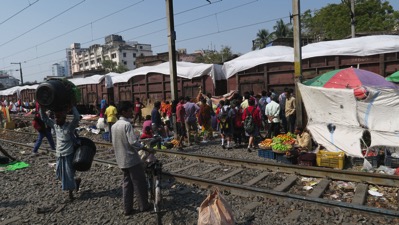


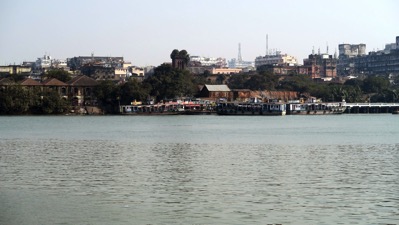

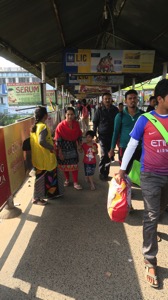
No comments:
Post a Comment